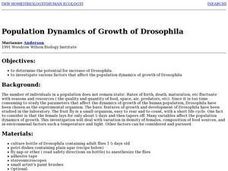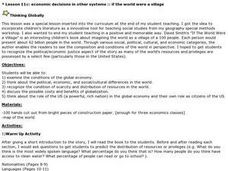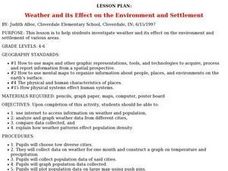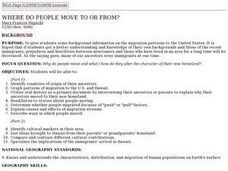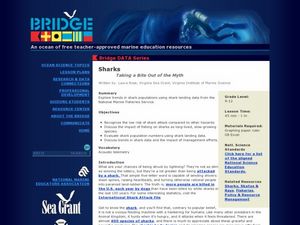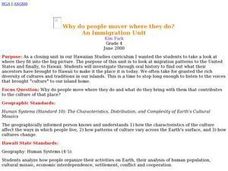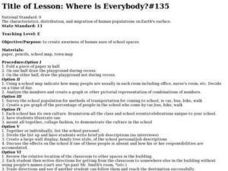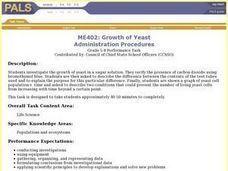Curated OER
Population Dynamics of Growth of Drosophila
Students experiment with Drosophila to determine if density of female flies, food sources, temperature and light affect the population dynamics of growth. Students graph their data and compare their results to the number of human...
Curated OER
The Motivation for Movement
Students explore the geographic theme of movement. In this migration lesson plan, students discuss push-pull factors that motivate immigrants and interpret illegal immigration data. Students also discuss the difficulties that illegals face.
Curated OER
If the World Were a Village...
Your class members explore concept that the world is a large place, examine how statistics can be used to help in understanding the world and its people, and create illustrations or graphs of statistics found in the award-winning...
Global Change
Impact of Climate Change on the Desert Pupfish
A fish that lives in the desert? You and your class can meet the desert pupfish as they examine its habitat, the role humans play in diminishing water supplies, and how climate change might impact this fishy friend. There are four short...
Curated OER
Wetland vs. Stream Macroinvertebrates
A link to a comprehensive macroinvertebrate guide gives you the information needed to prepare for this field study activity. Sample macroinvertebrates are collected from areas representing different environmental conditions. Junior...
Curated OER
Weather and its Effect on the Environment and Settlement
Students, after choosing two diverse cities, collect data on weather for a month and construct a graph on temperature and precipitation. After collecting population data of said cities, and graphing it, they plot population on a large...
Curated OER
Cartogram of the Great Compromise
Young scholars create cartograms of populations during 1790.
Curated OER
Creating Climographs
Students chart statistical information on graphs, interpret the information and use it to explain spatial relationships, and identify the relationship between climate and vegetation.
Curated OER
Where Do People Move To Or From?
Students identify countries of origin of their ancestors, graph patterns of migration to the U.S. and Hawaii, then utilize oral history as a primary document by interviewing their ancestors or parents to explain why they moved to their...
Curated OER
Native Species Restoration: Is Saving One Species Hurting Another?
Pupils investigate the effect of human activities upon the environment. The studying experience encourages students to think about the issues involved in native species restoration.
Curated OER
The Effect of Temperature on Cricket Chirping
Young scholars examine the effect of temperature on how often crickets chirp. In groups, they complete the experiment and answer lab discussion questions. They create a graph of temperatures and the amount of chirps and discuss the results.
Curated OER
Bugs, Bugs, Everywhere!
Students collect and compare bugs using magnifying lenses and graph data based on their comparisons. In this bugs lesson plan, students also make an aspirator by using a jar, tubing, and screen.
Curated OER
Sharks ~ Taking a Bite Out of the Myth
The first thing to know about this lesson is that the commercial fisheries data for the activity no longer seems to be available. That being said, there are fascinating links to other websites, some about the comparative odds of being...
Curated OER
See Turtles Nest! See Turtles Hatch!
Students graph data of sea turtles hatching rates from Watamu/Malindi Marine National Park and Reserve in Kenya. In this math lesson, students use real life science data to calculate mean and median values. Students use...
Curated OER
Mapping Possible Solutions
Fourth graders propose possible sites for the heart of Florida state capital by mapping collected data onto a Florida state map and recording data in a Travel Log.
Curated OER
Vampires: Fact or Fiction?
Learners predict how many vampires are in the world, based on the legend that, once bitten, each victim becomes a vampire. Extrapolating how many vampires would populate the earth in 30+ weeks, students then compare the total predicted...
Curated OER
Monitoring an Epidemic: Analyzing Through Graphical Displays Factors Relating to the Spread of HIV/AIDS
Tenth graders differentiate pandemic and epidemic. In this health science lesson, 10th graders analyze how HIV and AIDS affect different countries. They construct and interpret different types of graphs.
Curated OER
Why do people mover where they do?
Students read factual stories of migration to Hawaii, analyze and explain push and pull factors, interview parents about their cultural heritage, identify countried of origin of their ancestors, graph migration patterns on an world map,...
Curated OER
Where is Everybody?#135
Students examine the human uses of school spaces through a variety of activities. They draw the playground during recess and not during recess. They determine how many people use each room at different times before graphing the...
Curated OER
Bird Beak Buffet
Students complete an activity that allows them to better understand that birds traits are closely related to what they eat, where they live, etc. In this bird trait lesson students complete an activity, create a data board and...
Curated OER
Oodles of Poodles
Students solve equations by graphing. In this algebra lesson, students differentiate between functions and relations. They use the TI to graph their equation and analyze the graph.
Curated OER
Carrying Capacity of Ecosystems
Students define population and carrying. In this algebra lesson, students explore exponential growth and decay based on animals and things that grow or decrease exponentially. They graph their findings and discuss their results as they...
Curated OER
Math: Skyscraper Comparison
Young scholars examine skyscrapers by conducting Internet research and by creating and interpreting graphs. After reading the book, "Skyscraper," they discuss reasons why the structures are built. Once they have researched the tallest...
Curated OER
ME402: Growth of Yeast
Students investigate the growth of yeast in a sugar solution. They verify the pressure of carbon dioxide using bromothymol blue. Students are asked to describe the difference between the contents of the test tubes used and to explain...
